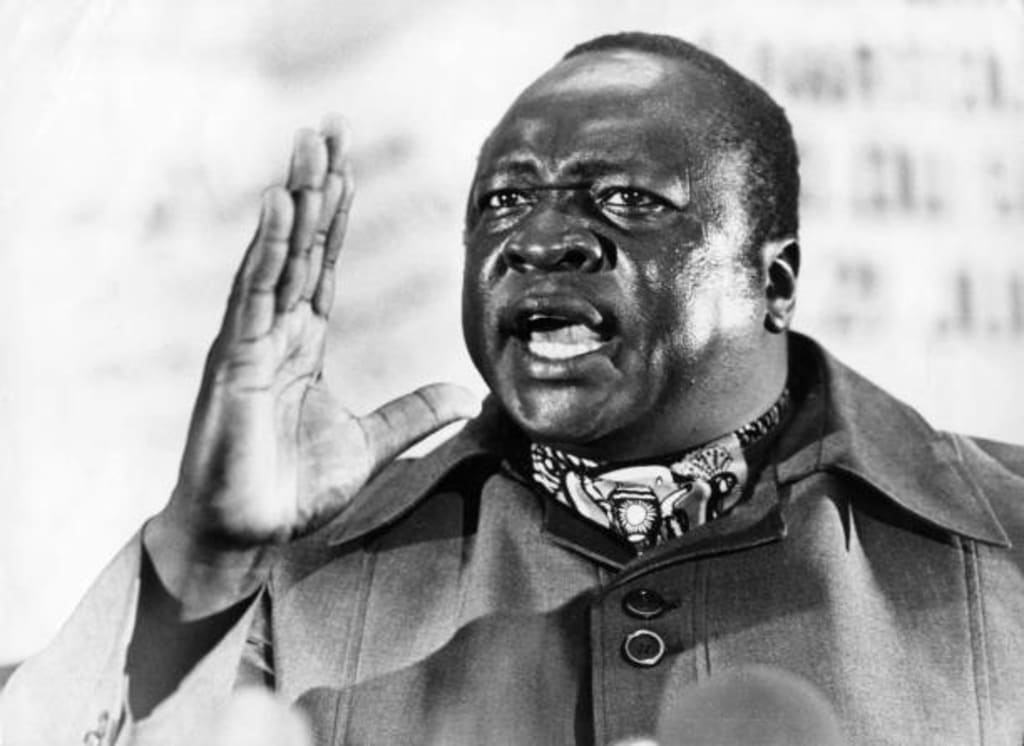Idi Amin's
Former President of Uganda

Idi Amin was a controversial figure in Ugandan history, known for his brutal regime and human rights abuses. Here is a brief biography of his life and career
Idi Amin Father was born around 1925 in Koboko, Uganda. His exact birth date is unknown, as birth records were not kept in the area at the time. He was a member of the Kakwa ethnic group, and his father was a farmer and herbalist.
Amin joined the British colonial army in 1946, and he served in various units in Uganda, Kenya, and Somalia over the next two decades. He rose through the ranks to become a sergeant-major, and he was known for his physical strength and bravery. However, he was also known for his brutality and for his tendency to disobey orders.
In 1971, Amin seized power in a military coup, overthrowing the democratically-elected government of President Milton Obote. Amin declared himself president and commander-in-chief of the armed forces, and he set about consolidating his power.
Amin's regime was marked by violence, corruption, and human rights abuses. He ordered the torture and execution of political opponents, journalists, and anyone else who he perceived as a threat to his rule. He expelled the country's Asian population, many of whom were of Indian descent and had lived in Uganda for generations. He also seized their property and businesses, causing economic turmoil in the country.
Amin's regime was also marked by military aggression. He invaded Tanzania in 1978, sparking a brief but bloody war that ended with his defeat and the eventual overthrow of his regime.
Throughout his rule, Amin cultivated a cult of personality, portraying himself as a strong and charismatic leader who was beloved by his people. He often appeared in military uniform, carrying a cane and wearing a variety of hats and medals.
Amin's regime was widely condemned by the international community, and he became a pariah on the world stage. However, he maintained friendly relations with some countries, including Libya, Iraq, and the Soviet Union.
Amin was deposed in 1979, when Tanzanian forces invaded Uganda and overthrew his regime. He fled to exile in Saudi Arabia, where he lived until his death in 2003.
Idi Amin's legacy is a complicated one. While some Ugandans remember him as a strong and patriotic leader who stood up to foreign influence, many others remember him as a brutal dictator who presided over a period of terror and repression. His regime was responsible for the deaths of an estimated 300,000 people, and his legacy continues to be a contentious topic in Uganda and beyond.
Idi Amin's personal life and activities within his residence during his time in power, there is limited information available. However, some reports suggest that Amin was known for his lavish and extravagant lifestyle, and he lived in several different palaces and residences during his time in power.
One of his most famous residences was the Presidential Palace in Kampala, which was also known as Amin's "State House". The palace was known for its opulence and grandeur, and it was decorated with expensive furnishings, including gold-plated furniture and crystal chandeliers. Amin was also known for his love of cars, and he reportedly had a fleet of luxury vehicles, including Rolls Royces and Mercedes-Benzes.
Amin was also known for hosting lavish parties and gatherings at his residences, often inviting foreign dignitaries and other important guests. However, it is important to note that these events were often a stark contrast to the poverty and violence that was rampant in the rest of the country under Amin's rule.
In terms of his personal life, Amin had several wives and a large number of children. He was known for his flamboyant and extravagant behavior, including his love of music and dance. However, there were also reports of domestic violence and abuse within his personal relationships.
Idi Amin's time in power was marked by both positive achievements and a number of controversial and negative actions. Here are some examples of the good and bad things that happened during his regime:
Bad Things:
1. Human Rights Abuses: Amin's regime was characterized by widespread human rights abuses, including torture, extrajudicial killings, and forced disappearances. Thousands of Ugandans were killed or went missing under Amin's rule.
2. Political Repression: Amin's government was authoritarian and oppressive, with little to no political freedom for opposition parties or dissenting voices.
3. Expulsion of Asians: In 1972, Amin ordered the expulsion of Uganda's Asian population, many of whom had lived in the country for generations. This led to the displacement of over 70,000 people and created significant economic disruption.
4. Economic Mismanagement: Amin's economic policies were characterized by mismanagement and corruption, which contributed to a decline in Uganda's economy and standard of living.
Good Things:
1. Infrastructure Development: Amin was known for his efforts to develop Uganda's infrastructure, including the construction of new roads, bridges, and other public works projects.
2. Education and Healthcare: Amin invested in education and healthcare during his regime, building new schools and hospitals across the country.
3. African Unity: Amin was a vocal advocate for African unity and played a role in a number of pan-African initiatives, including the founding of the Organization of African Unity (now known as the African Union).
4. Support for Palestinian Liberation: Amin was a vocal supporter of Palestinian liberation and provided refuge to Palestinian fighters during his time in power.
It is important to note that the positives mentioned above are often overshadowed by the numerous negative aspects of Amin's regime. While some may argue that there were some positive accomplishments during his rule, the human rights abuses and political repression that characterized his government are widely regarded as unacceptable and unjustifiable.
It is worth noting that many of these details about Amin's personal life and activities come from accounts provided by his former associates and insiders, and there is a great deal of secrecy and misinformation surrounding Amin's regime. The true extent of his personal activities and behavior may never be fully known.






Comments
There are no comments for this story
Be the first to respond and start the conversation.